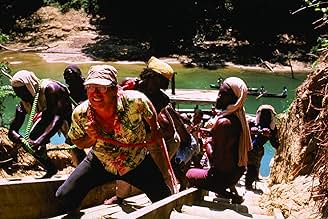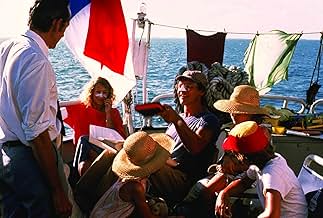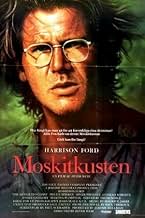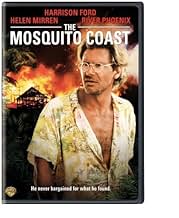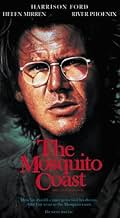IMDb RATING
6.6/10
33K
YOUR RATING
An inventor spurns his city life and moves his family into the jungles of Central America to make a utopia.An inventor spurns his city life and moves his family into the jungles of Central America to make a utopia.An inventor spurns his city life and moves his family into the jungles of Central America to make a utopia.
- Awards
- 1 win & 3 nominations total
Alice Heffernan-Sneed
- Mrs. Polski
- (as Alice Sneed)
- Director
- Writers
- All cast & crew
- Production, box office & more at IMDbPro
Featured reviews
The Mosquito Coast is a movie that has many things going for it, but fails to combine all its excellent ingredients in a way that makes it feel great. I think there's still a good deal to like, but overall, it feels a bit unsatisfying and disappointing.
You have an interesting premise, with a deranged father leading his family to live in the wilderness. You have Harrison Ford playing one of the most villainous characters he's ever played (maybe the most villainous?) You have a great supporting cast with people like Helen Mirren and River Phoenix. You've got a fantastic composer in Maurice Jarre. And then there's Peter Weird directing, who's made several classics, often involving themes of isolation or "adventures" that go wrong or people getting by in unfamiliar situations.
At the end... it's fine? It never really hits that point where it becomes something else, though. Maybe it's Ford's character- while I found it a breath of fresh air for the protagonist to have few, if any, redeeming qualities, maybe that hurt my engagement with the film in the long run.
Anyway, good premise, good acting, good music, and the the way it's shot is solid, too. Maybe it just needed a tighter script to keep things more interesting, or at least more consistent. It does feel poorly adapted into a movie, screenplay-wise. You can tell these lines are from a novel, with much of the dialogue sounding like they're just reading off a page.
You have an interesting premise, with a deranged father leading his family to live in the wilderness. You have Harrison Ford playing one of the most villainous characters he's ever played (maybe the most villainous?) You have a great supporting cast with people like Helen Mirren and River Phoenix. You've got a fantastic composer in Maurice Jarre. And then there's Peter Weird directing, who's made several classics, often involving themes of isolation or "adventures" that go wrong or people getting by in unfamiliar situations.
At the end... it's fine? It never really hits that point where it becomes something else, though. Maybe it's Ford's character- while I found it a breath of fresh air for the protagonist to have few, if any, redeeming qualities, maybe that hurt my engagement with the film in the long run.
Anyway, good premise, good acting, good music, and the the way it's shot is solid, too. Maybe it just needed a tighter script to keep things more interesting, or at least more consistent. It does feel poorly adapted into a movie, screenplay-wise. You can tell these lines are from a novel, with much of the dialogue sounding like they're just reading off a page.
Harrison Ford is often described as a movie star rather than an actor, but "The Mosquito Coast" easily disproves that (actually, so does "Blade Runner", but I digress). It's a fevered performance on which the whole film rests. Easily worth a watch.
But it also demands a lot from the audience. For one, there's an undercurrent of dread that's there right from the start and it's hard to watch Ford's mercurial character drag his family to the far ends of the jungle essentially to reboot civilization (a myopic one, at that). All I could think of was my family in that situation (hell, no).
I'm not going to lie, this is a hard movie, rife with misfortune; on occasions shocking, infuriating and exhausting. But I was glued to my seat until the very end, primarily because of Ford's deteriorating mental state. That's a house of horrors unto itself. This is a well-directed movie but man if it's not wearing.
But it also demands a lot from the audience. For one, there's an undercurrent of dread that's there right from the start and it's hard to watch Ford's mercurial character drag his family to the far ends of the jungle essentially to reboot civilization (a myopic one, at that). All I could think of was my family in that situation (hell, no).
I'm not going to lie, this is a hard movie, rife with misfortune; on occasions shocking, infuriating and exhausting. But I was glued to my seat until the very end, primarily because of Ford's deteriorating mental state. That's a house of horrors unto itself. This is a well-directed movie but man if it's not wearing.
Someone once said that ignorance is bliss; and if you follow through the reasoning process that leads to that conclusion, you discover that it is, indeed, true. Another way of saying it would be, that the less you know, the happier you are likely to be; kind of a `what you don't know can't hurt you' perspective, but true, nevertheless. Conversely then, what can be said about knowledge? About knowing too much? Can genius, for example, be equated with a life of torment? Can knowing-- and more precisely, understanding-- too much bring about anguish and unhappiness? The answer to that , of course, cannot be absolute, for there are a number of variables that must first be factored in, one of the most prevalent being that thin line that separates the true genius from madness, and how close to which side of that line the individual in question resides. It's a situation examined in depth by director Peter Weir, in his riveting, thought provoking drama, `The Mosquito Coast,' starring Harrison Ford, Helen Mirren and River Phoenix.
Allie Fox (Ford) is a family man; he has a devoted wife, `Mother (Mirren),' and four children, the eldest of whom, Charlie (Phoenix), thinks his dad is a genius. Which he is. Allie Fox is an inventor who believes it's man's job to tinker with an unfinished world and make it work. He is also a true individual, the epitome of the man who marches to his own drum-- and in his case, his drum is the `only' one he will march to. He sees such potential in everything around him, but he also sees that very same potential being wasted at every turn by seemingly everyone, from the average guy just trying to make a living, to a Corporate America he sees as the impetus that has already begun to destroy the nation. All around him he sees a country and a people that has lost that spirit that made America strong; he sees ruin and decay in everything: In the lack of quality in any and all manufactured goods, and in the apathy of the acquiescent consumer. And he's had enough. Refusing to stand by and watch America die, he packs up and moves his family to a remote section of a jungle in Central America, near the coast of La Moskitia; and it is there that he discovers a land, that to him, is paradise-- and where he also encounters the demons that plague those who know too much, and feel too deeply.
Working from an intelligent and penetrating screenplay by Paul Schrader (adapted from the novel by Paul Theroux), Weir delivers a thoroughly engrossing character study that parallels Werner Herzog's 1972 masterpiece, `Aguirre, The Wrath of God,' inasmuch as it examines the effects of self-perceived omnipotence in an individual driven to extreme measures by a singular quest for power and autonomy (albeit in different times and with different motives). Allie Fox, like Don Lope de Aguirre, becomes a victim of his own obsession, consequently victimizing those around him, as well, by losing sight of his own ideals and getting swept away in the current of a distorted sense of purpose. Allie leaves an environment he perceives as defective for one that is ultimately equally flawed-- that being the environs within his own mind. All of which is hauntingly presented by Weir, aided by John Seale and Maurice Jarre, whose cinematography and score, respectively, helps to create the atmosphere that so effectively underscores the drama of the story.
As Allie Fox, Harrison Ford gives a performance that is one of his best and most powerful ever, affecting a commanding presence that dominates virtually every scene-- so compelling that his presence is felt even when he is absent from the screen. This isn't a character you are going to like, necessarily; and yet you are going to care about him, because there's something in him that reflects and addresses concerns that are universal, which makes Allie someone to whom many in the audience will be able to relate and identify. He's the man who believes that he truly `can' be an island unto himself, and beyond his personal peccadilloes, that is the kind of strength that demands admiration; for at the same time, it enables forgiveness. It's a solid portrayal of a man at cross purposes with himself, who realizes to some extent what he is doing, yet adamantly refuses to back down. And this is the man Ford brings to life so vividly; he's convincing, and his Allie Fox is disconcertingly real.
Helen Mirren also turns in a memorable performance as Allie's devoted wife, whom he calls `Mother.' Mirren says more without dialogue-- through a subtle expression, or even the merest glance-- than most actors do with a limitless number of words. And it's her moments of silence that are some of the most telling of the film, while at the same time adding strength to the lines she does recite. In the end, Mirren creates a character who chooses her words well, then uses them wisely-- and it's a portrayal that is, without question, one of the strengths of the film. In the way Mother looks at Allie, Mirren conveys that love and absolute loyalty that makes everything they do believable. There is complete trust there, which you can feel when, standing in her kitchen, for example, she gives a final glance at the dishes piled high in the sink; a glance at the life she's leaving behind to follow her husband. And she's happy. In it's simplicity and brevity, it's a powerful scene that says so much about who she is, and who `they' are. And Mirren makes it work beautifully.
Phoenix does a solid job, too, providing the narrative of the film as Charlie. He is perfectly cast as Ford's son, and he succeeds in giving `The Mosquito Coast' that sense of reflection and perspective that makes it a truly memorable, and emotionally involving, film. 9/10.
Allie Fox (Ford) is a family man; he has a devoted wife, `Mother (Mirren),' and four children, the eldest of whom, Charlie (Phoenix), thinks his dad is a genius. Which he is. Allie Fox is an inventor who believes it's man's job to tinker with an unfinished world and make it work. He is also a true individual, the epitome of the man who marches to his own drum-- and in his case, his drum is the `only' one he will march to. He sees such potential in everything around him, but he also sees that very same potential being wasted at every turn by seemingly everyone, from the average guy just trying to make a living, to a Corporate America he sees as the impetus that has already begun to destroy the nation. All around him he sees a country and a people that has lost that spirit that made America strong; he sees ruin and decay in everything: In the lack of quality in any and all manufactured goods, and in the apathy of the acquiescent consumer. And he's had enough. Refusing to stand by and watch America die, he packs up and moves his family to a remote section of a jungle in Central America, near the coast of La Moskitia; and it is there that he discovers a land, that to him, is paradise-- and where he also encounters the demons that plague those who know too much, and feel too deeply.
Working from an intelligent and penetrating screenplay by Paul Schrader (adapted from the novel by Paul Theroux), Weir delivers a thoroughly engrossing character study that parallels Werner Herzog's 1972 masterpiece, `Aguirre, The Wrath of God,' inasmuch as it examines the effects of self-perceived omnipotence in an individual driven to extreme measures by a singular quest for power and autonomy (albeit in different times and with different motives). Allie Fox, like Don Lope de Aguirre, becomes a victim of his own obsession, consequently victimizing those around him, as well, by losing sight of his own ideals and getting swept away in the current of a distorted sense of purpose. Allie leaves an environment he perceives as defective for one that is ultimately equally flawed-- that being the environs within his own mind. All of which is hauntingly presented by Weir, aided by John Seale and Maurice Jarre, whose cinematography and score, respectively, helps to create the atmosphere that so effectively underscores the drama of the story.
As Allie Fox, Harrison Ford gives a performance that is one of his best and most powerful ever, affecting a commanding presence that dominates virtually every scene-- so compelling that his presence is felt even when he is absent from the screen. This isn't a character you are going to like, necessarily; and yet you are going to care about him, because there's something in him that reflects and addresses concerns that are universal, which makes Allie someone to whom many in the audience will be able to relate and identify. He's the man who believes that he truly `can' be an island unto himself, and beyond his personal peccadilloes, that is the kind of strength that demands admiration; for at the same time, it enables forgiveness. It's a solid portrayal of a man at cross purposes with himself, who realizes to some extent what he is doing, yet adamantly refuses to back down. And this is the man Ford brings to life so vividly; he's convincing, and his Allie Fox is disconcertingly real.
Helen Mirren also turns in a memorable performance as Allie's devoted wife, whom he calls `Mother.' Mirren says more without dialogue-- through a subtle expression, or even the merest glance-- than most actors do with a limitless number of words. And it's her moments of silence that are some of the most telling of the film, while at the same time adding strength to the lines she does recite. In the end, Mirren creates a character who chooses her words well, then uses them wisely-- and it's a portrayal that is, without question, one of the strengths of the film. In the way Mother looks at Allie, Mirren conveys that love and absolute loyalty that makes everything they do believable. There is complete trust there, which you can feel when, standing in her kitchen, for example, she gives a final glance at the dishes piled high in the sink; a glance at the life she's leaving behind to follow her husband. And she's happy. In it's simplicity and brevity, it's a powerful scene that says so much about who she is, and who `they' are. And Mirren makes it work beautifully.
Phoenix does a solid job, too, providing the narrative of the film as Charlie. He is perfectly cast as Ford's son, and he succeeds in giving `The Mosquito Coast' that sense of reflection and perspective that makes it a truly memorable, and emotionally involving, film. 9/10.
The Mosquito Coast is an odd film. It attempts to talk about issues which are important and which few films address, fails to communicate them clearly, yet isn't sucked into the maelstrom of moralizing and sententiousness that films like this almost inevitably enter. Instead, it occupies some sort of odd middle ground of ambiguity and murkiness. One gets the feeling that the film is a lot like the Fox family: they know they're going upstream but they have no specific destination, and some of them really aren't sure why they're going there in the first place.
I felt from the very beginning that the film failed to define its ideals or set a sense of clear direction. Harrison Ford, in a performance which I found unconvincing (perhaps because of the inability of the film to articulate what motivated him), rambles on about everything from the Japanese to nuclear war. There's a large difference between subtlety, i.e. not spelling things out for the viewer, and incoherence. This was incoherent. We know that he's unhappy with America, but I don't know what he's really looking for, what motivates him, etc.. Maybe he doesn't know. But if that's the case, it should be made clear.
A good example of how this plays out is his attempt to bring ice to the "noble savages." Why does he do this? Because "ice is civilization." But why does he want to bring them civilization? It seemed to me that civilization was something he was having a lot of problems with. I assume that the novel explained this more clearly and the film failed to translate properly. He of course stated earlier in the film that the savages would probably think ice a sort of jewel. So? Why does this matter? Is he looking for lost innocence?
Then later in the film "Mother" says she wishes to go to Mr. Haddy's place. He responds "And live like savages?" I can only assume that he wishes to establish some sort of elementary civilization where a small community lives in peace and harmony. Or perhaps he's just looking to withdraw from everyone, as his spurning of Mr. Haddy's gifts would show. Also, a possible literary reference is the name of their craft, Victory, which is the name of a very dull Joseph Conrad novel about a man who withdraws from life and goes to live on an island. Extreme misanthropy? Unlikely.
A possible light at the end is his talk about man not being made to walk upright. Is he looking for some sort of return to primal existence? But then why invent air conditioning in Geronimo? It all adds up to a very disorganized mess, both in Mr. Fox's head, and on screen. The Mosquito Coast is like a puzzle that still has all the pieces, but rather than fit them together, Weir just threw them all in the box and let us look at them.
I felt from the very beginning that the film failed to define its ideals or set a sense of clear direction. Harrison Ford, in a performance which I found unconvincing (perhaps because of the inability of the film to articulate what motivated him), rambles on about everything from the Japanese to nuclear war. There's a large difference between subtlety, i.e. not spelling things out for the viewer, and incoherence. This was incoherent. We know that he's unhappy with America, but I don't know what he's really looking for, what motivates him, etc.. Maybe he doesn't know. But if that's the case, it should be made clear.
A good example of how this plays out is his attempt to bring ice to the "noble savages." Why does he do this? Because "ice is civilization." But why does he want to bring them civilization? It seemed to me that civilization was something he was having a lot of problems with. I assume that the novel explained this more clearly and the film failed to translate properly. He of course stated earlier in the film that the savages would probably think ice a sort of jewel. So? Why does this matter? Is he looking for lost innocence?
Then later in the film "Mother" says she wishes to go to Mr. Haddy's place. He responds "And live like savages?" I can only assume that he wishes to establish some sort of elementary civilization where a small community lives in peace and harmony. Or perhaps he's just looking to withdraw from everyone, as his spurning of Mr. Haddy's gifts would show. Also, a possible literary reference is the name of their craft, Victory, which is the name of a very dull Joseph Conrad novel about a man who withdraws from life and goes to live on an island. Extreme misanthropy? Unlikely.
A possible light at the end is his talk about man not being made to walk upright. Is he looking for some sort of return to primal existence? But then why invent air conditioning in Geronimo? It all adds up to a very disorganized mess, both in Mr. Fox's head, and on screen. The Mosquito Coast is like a puzzle that still has all the pieces, but rather than fit them together, Weir just threw them all in the box and let us look at them.
Frothing at the mouth with disgust for his homeland America, inventor Allie Fox (Harrison Ford), with family in tow, pulls up roots, and moves to Central America. Here, he proceeds to build a new life in the jungle, using his mechanical skills, his inventiveness, and in particular his patented machine, which produces ice, sans electricity. "Ice is civilization", he proclaims with unctuous authority. That will be the foundation for his utopian dream. But Allie is so headstrong, so convinced of his infallibility that his vision blinds him to reality. And the film's ending is poignant.
Delusion and self-deception breed nightmarish outcomes. And the cinema, through the years, has dramatized these themes quite well, in films like "Aguirre: The Wrath Of God", "Fitzcaraldo", and "Deliverance". In real life, delusion and self-deception were the basis for the events surrounding American preacher Jim Jones who, in the late 1970s, relocated his naive flock to the jungles of Guyana, whereupon he established Jonestown, envisioned as a religious utopia. The result was tragic.
Beyond the deep themes thus expressed in the script, "The Mosquito Coast" looks good visually. The tropical scenery is spectacular. Production design and cinematography are terrific. And the film's score, by Maurice Jarre, is wonderfully exotic and majestic.
My only complaint is the character of Allie Fox, who at some point badmouths just about everyone and everything. I could have wished for a quieter, less loquacious, madman. Then too, Harrison Ford plays Fox in a way that overrides subtext. In short, Fox not only is delusional and self-deceptive, he's also preachy, domineering, and totally lacking in compassion for others, someone whom we as viewers cannot root for or have any empathy with.
"The Mosquito Coast" reminds us that the grass is not always greener on the other side of the fence. Chasing that elusive pot of gold at the end of the rainbow is for dreamers. This is a good film to watch when you're facing a pile of problems. You could be like Allie's family, trying to forge some existence in the jungles and listening to the rants of an icy madman.
Delusion and self-deception breed nightmarish outcomes. And the cinema, through the years, has dramatized these themes quite well, in films like "Aguirre: The Wrath Of God", "Fitzcaraldo", and "Deliverance". In real life, delusion and self-deception were the basis for the events surrounding American preacher Jim Jones who, in the late 1970s, relocated his naive flock to the jungles of Guyana, whereupon he established Jonestown, envisioned as a religious utopia. The result was tragic.
Beyond the deep themes thus expressed in the script, "The Mosquito Coast" looks good visually. The tropical scenery is spectacular. Production design and cinematography are terrific. And the film's score, by Maurice Jarre, is wonderfully exotic and majestic.
My only complaint is the character of Allie Fox, who at some point badmouths just about everyone and everything. I could have wished for a quieter, less loquacious, madman. Then too, Harrison Ford plays Fox in a way that overrides subtext. In short, Fox not only is delusional and self-deceptive, he's also preachy, domineering, and totally lacking in compassion for others, someone whom we as viewers cannot root for or have any empathy with.
"The Mosquito Coast" reminds us that the grass is not always greener on the other side of the fence. Chasing that elusive pot of gold at the end of the rainbow is for dreamers. This is a good film to watch when you're facing a pile of problems. You could be like Allie's family, trying to forge some existence in the jungles and listening to the rants of an icy madman.
The Life and Times of Harrison Ford
The Life and Times of Harrison Ford
Take a look back at Harrison Ford's movie career in photos.
Did you know
- TriviaWhile building the town set in Belize, the crew unearthed an ancient Mayan temple. It notified the Belize government, which declared the site an important historical find.
- GoofsThe "Ice from Fire" technique for using heat, ammonia and hydrogen was actually invented in 1824 by the English scientist Michael Faraday.
- Quotes
Emily Spellgood: [to Charlie] I think about you when I go to the bathroom.
- SoundtracksClap Your Hands
Words and Music by Gary Johnson
Performed by Grace Gospel Primary School Choir
- How long is The Mosquito Coast?Powered by Alexa
Details
Box office
- Budget
- $25,000,000 (estimated)
- Gross US & Canada
- $14,302,779
- Opening weekend US & Canada
- $110,313
- Nov 30, 1986
- Gross worldwide
- $14,302,779
- Runtime1 hour 57 minutes
- Color
- Sound mix
- Aspect ratio
- 1.85 : 1
Contribute to this page
Suggest an edit or add missing content





